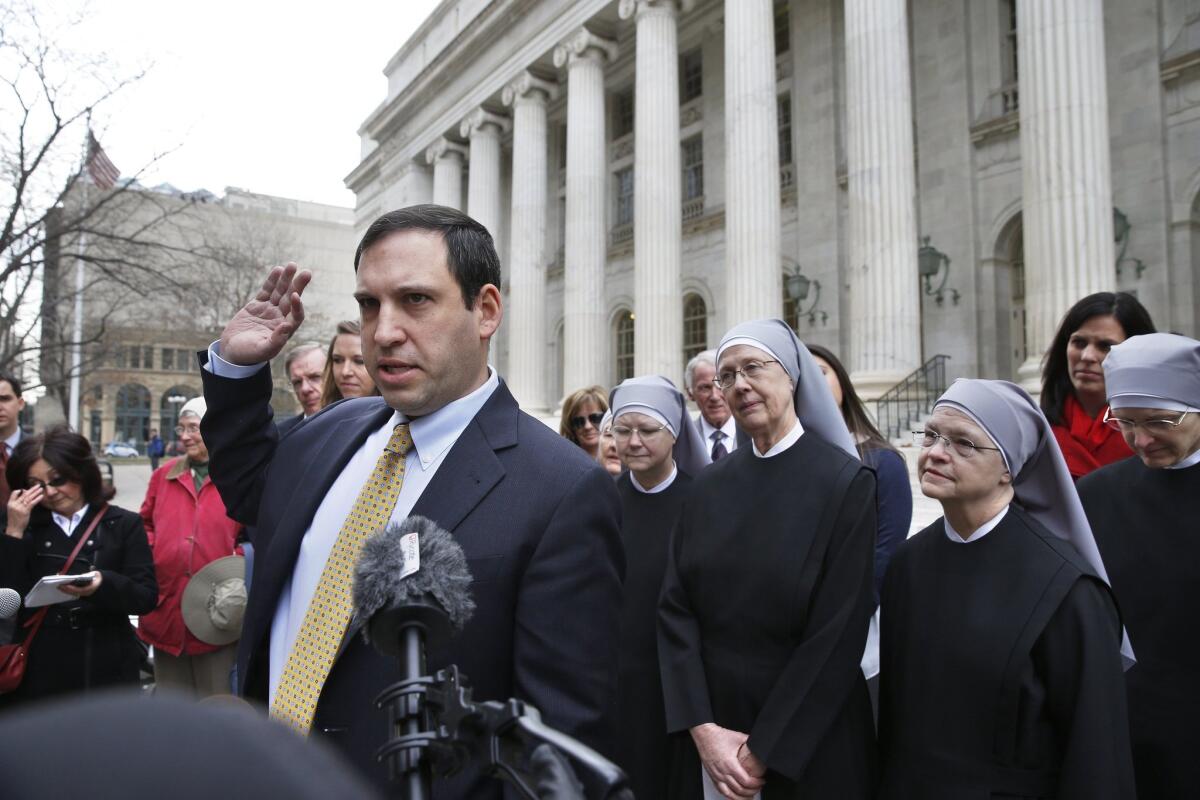Court rules against Little Sisters of the Poor in contraceptive coverage case

Attorney Mark Rienzi, who represented the Little Sisters of the Poor, talks to reporters last year in Denver.
- Share via
A federal appeals court ruled Tuesday that there is a limit to how far the government must bend to accommodate religious objections to the federal healthcare exchange.
The U.S. 10th Circuit Court of Appeals ruled that if the Colorado-based Little Sisters of the Poor want to refuse contraceptive coverage to their employees, they must sign a waiver to be exempted, and that such a waiver is not a substantial burden on the nuns’ religious freedom.
The 2-1 decision is one of the few victories the U.S. government can claim in defense of the healthcare law in the contraceptive mandate debate.
Hobby Lobby, a business run by evangelical Christians, successfully argued before the U.S. Supreme Court last year that a mandate to provide contraception to female employees violated their belief that life begins at conception.
The high court agreed that for-profit organizations like Hobby Lobby required protection, but did not say how far such protections would go.
In response, on Aug. 27, 2014, Affordable Care Act administrators created a waiver for religious nonprofits that would grant them an exemption from contraceptive coverage.
But the Little Sisters of the Poor, who run the Mullen Home for the Aged in Denver, argued before a three-judge panel of the 10th Circuit that the waiver itself both crosses the nuns’ moral boundary by endorsing contraceptives and gives control of their healthcare program to the government.
“The government scheme here is a parasite that’s built onto the Little Sister’s [health] plan,” said attorney Mark Rienzi of the Becket Fund for Religious Liberty, which also represented Hobby Lobby. “That violates their faith. They can’t allow that to happen.”
Rienzi said the Becket Fund and Little Sisters of the Poor would meet soon to decide whether to appeal the decision to the Supreme Court.
A U.S. District Court judge in December denied the Little Sisters of the Poor’s objection to the waiver, but they were granted an injunction by the U.S. Supreme Court and the case went to the 10th Circuit.
The objection was unusual, according to the unsigned opinion handed down Tuesday.
“Most religious liberty claimants allege that a generally applicable law or policy without a religious exception burdens religious exercise,” according to the decision, noting that most cases begin with prisoners demanding a religious right.
But in the Little Sisters of the Poor case and accompanying suits by self-insured religious objectors and religious universities, the government made clear attempts to offer a religious exemption, the judges wrote.
“Although plaintiffs allege the administrative tasks required to opt out of the mandate make them complicit in the overall delivery scheme, opting out instead relieves them from complicity,” according to the opinion.
The judges said the difference between Hobby Lobby and the Little Sisters of the Poor is that Hobby Lobby faced fines for every day of noncompliance.
The Little Sisters of the Poor faced no such burden, the judges ruled.
10th Circuit Judge Bobby R. Baldock, the lone dissenter, agreed with the decision on the Little Sisters of the Poor but said other self-insured groups were indeed substantially burdened when they faced fines for refusing to provide contraceptives because of their religious beliefs.
Follow @NigelDuara for national news
More to Read
Sign up for Essential California
The most important California stories and recommendations in your inbox every morning.
You may occasionally receive promotional content from the Los Angeles Times.














